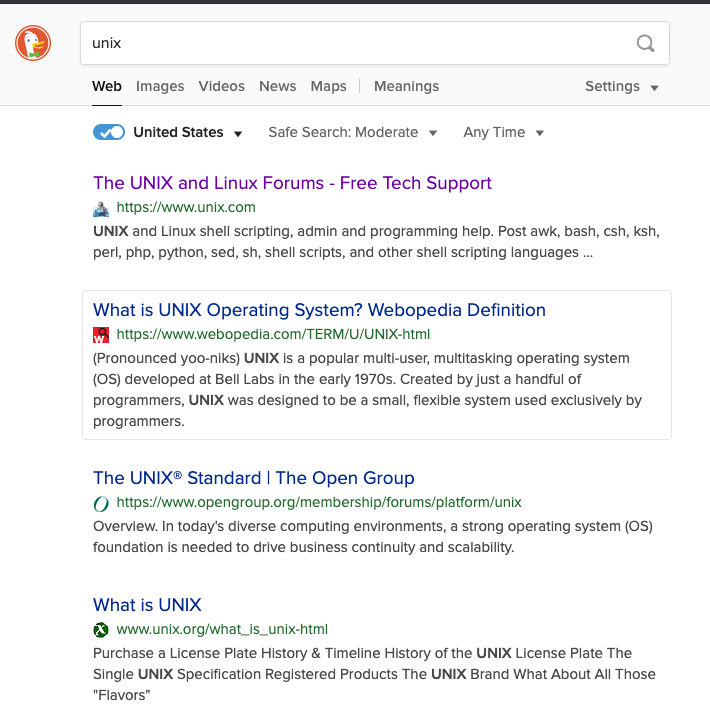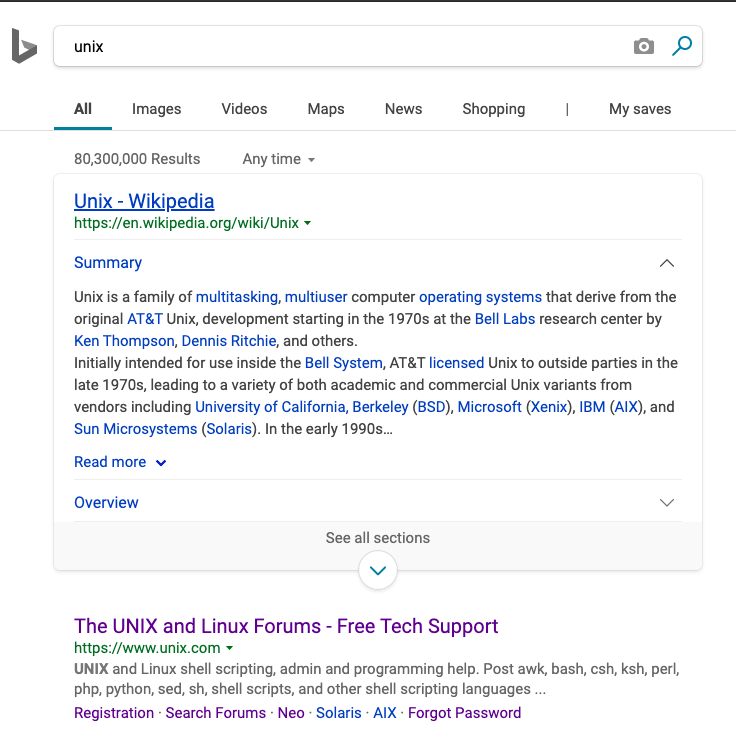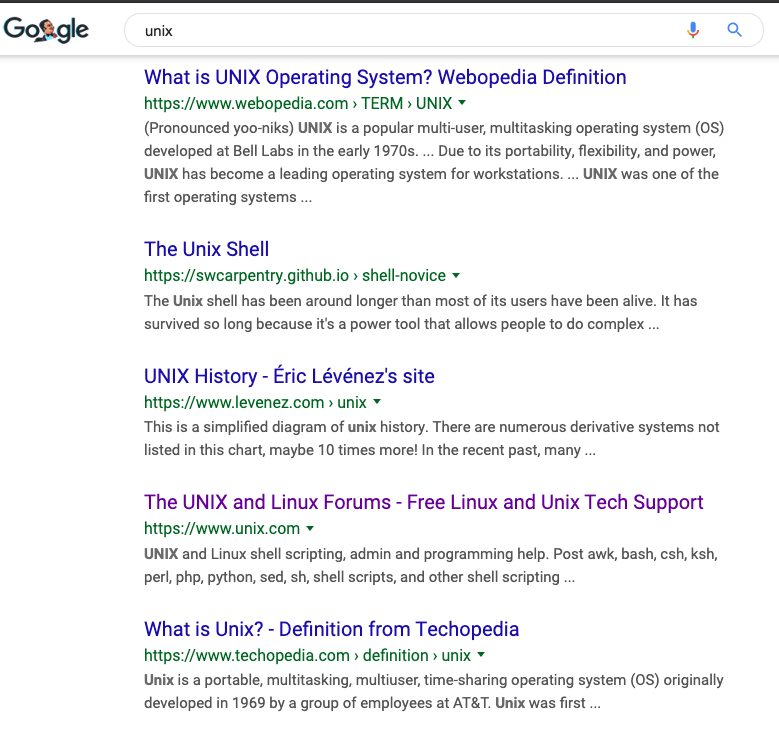|
|
Sponsored Content
The Lounge
What is on Your Mind?
Search Results for the UNIX keyword - Google, Bing, DuckDuckGo
Post 303038857 by Neo on Monday 16th of September 2019 02:28:28 AM
|
|
6 More Discussions You Might Find Interesting
1. Shell Programming and Scripting
Hi,
we can open firefox Google to open a webpage.But, how can I open the firefox directly with the search term given at commandline and directly display the page with search results. (1 Reply)
Discussion started by: ramkishore
1 Replies
2. Windows & DOS: Issues & Discussions
Has anybody managed to find anything whatsoever on the Microsoft Knowledgebase since they changed the search engine to "Bing".
Does anybody have a link to the old search engine which despite its faults did let you see Microsoft Knowledgebase articles ?
Ps: I just got 54,000 hits from Google... (0 Replies)
Discussion started by: methyl
0 Replies
3. Shell Programming and Scripting
Hello ,
When using vim, can ctag and cscope support recording search results and displaying the history results ? Once I jump to one tag, I can use :tnext to jump to next tag, but how can I display the preview search result? (0 Replies)
Discussion started by: 915086731
0 Replies
4. What is on Your Mind?
Hi Unix Gurus,
In my Co. we have intranet site hosted on Unix box. In Explorer there is a text box for searching information on internet. By default it is using Google Custom Search. This search engine is little old one. Now I want to patch this search engine with latest patch. If any one know... (0 Replies)
Discussion started by: sriramis4u
0 Replies
5. Shell Programming and Scripting
Hi
I want to implement something like this:
if( keyword1 exists)
then
check if(keyword2 exists in the same line)
then replace keyword 2 with New_Keyword
else
Add New_Keyword at the end of line
end if
eg:
Check for Keyword JUNGLE and add/replace... (7 Replies)
Discussion started by: dashing201
7 Replies
6. What is on Your Mind?
For over a decade, unix.com has been in the top tier for search referrals. The keyword "unix" used to rank #4, and when it was down, it was #9. At times, we were close to #2 on Google for the "unix" keyword. Now, in some geos (in the US for example yesterday), in Google search the "unix"... (28 Replies)
Discussion started by: Neo
28 Replies
LEARN ABOUT DEBIAN
gnunet-search
GNUNET-SEARCH(1) General Commands Manual GNUNET-SEARCH(1) NAME
gnunet-search - a command line interface to search for content on GNUnet SYNOPSIS
gnunet-search [OPTIONS] [+]KEYWORD [[+]KEYWORD]* gnunet-search [OPTIONS] [+]URI DESCRIPTION
Search for content on GNUnet. The keywords are case-sensitive. gnunet-search can be used both for a search in the global namespace as well as for searching a private subspace. -a LEVEL, --anonymity=LEVEL The -a option can be used to specify additional anonymity constraints. If set to 0, GNUnet will try to download the file as fast as possible, including using non-anonymous methods. If you set it to 1 (default), you use the standard anonymous routing algorithm (which does not explicitly leak your identity). However, a powerful adversary may still be able to perform traffic analysis (sta- tistics) to over time infer data about your identity. You can gain better privacy by specifying a higher level of anonymity, which increases the amount of cover traffic your own traffic will get, at the expense of performance. Note that your download performance is not only determined by your own anonymity level, but also by the anonymity level of the peers publishing the file. So even if you download with anonymity level 0, the peers publishing the data might be sharing with a higher anonymity level, which in this case will determine performance. Also, peers that cache content in the network always use anonymity level 1. This option can be used to limit requests further than that. In particular, you can require GNUnet to receive certain amounts of traffic from other peers before sending your queries. This way, you can gain very high levels of anonymity - at the expense of much more traffic and much higher latency. So set it only if you really believe you need it. The definition of ANONYMITY-RECEIVE is the following. 0 means no anonymity is required. Otherwise a value of 'v' means that 1 out of v bytes of "anonymous" traffic can be from the local user, leaving 'v-1' bytes of cover traffic per byte on the wire. Thus, if GNUnet routes n bytes of messages from foreign peers (using anonymous routing), it may originate n/(v-1) bytes of queries in the same time-period. The time-period is twice the average delay that GNUnet defers forwarded queries. The default is 1 and this should be fine for most users. Also notice that if you choose very large values, you may end up having no throughput at all, especially if many of your fellow GNUnet-peers all do the same. -c FILENAME, --config=FILENAME use config file (defaults: ~/.gnunet/gnunet.conf) -h, --help print help page -L LOGLEVEL, --loglevel=LOGLEVEL Change the loglevel. Possible values for LOGLEVEL are ERROR, WARNING, INFO and DEBUG. -o FILENAME, --output=FILENAME Writes a GNUnet directory containing all of the search results to FILENAME. -n, --no-network Only search locally, do not forward requests to other peers. -N VALUE, --results=VALUE automatically terminate the search after receiving VALUE results. -t VALUE, --timeout=VALUE Automatically timeout search after VALUE ms. Otherwise the search runs until gnunet-search is aborted with CTRL-C. -v, --version print the version number -V, --verbose print meta data from search results as well NOTES
You can run gnunet-search with an URI instead of a keyword. The URI can have the format for a namespace search or for a keyword search. For a namespace search, the format is gnunet://fs/sks/NAMESPACE/IDENTIFIER. For a keyword search, use gnunet://fs/ksk/KEYWORD[+KEYWORD]*. If the format does not correspond to a GNUnet URI, GNUnet will automatically assume that keywords are supplied directly. If multiple keywords are passed, gnunet-search will look for content matching any of the keywords. The prefix "+" makes a keyword manda- tory. # gnunet-search "Das Kapital" searches for content matching the keyword "Das Kapital". Whereas # gnunet-search +Das +Kapital Searches for content matching both mandatory keywords "Das" and "Kapital". Search results are printed by gnunet-search like this: gnunet-download -o "COPYING" gnunet://fs/chk/HASH1.HASH2.SIZE Description: The GNU Public License Mime-type: text/plain The first line contains the command to run to download the file. The suggested filename in the example is COPYING. The GNUnet URI con- sists of the key and query hash of the file and finally the size of the file. After the command to download the file GNUnet will print meta-data about the file as advertised in the search result, here "The GNU Public License" and the mime-type (see the options for gnunet-publish on how to supply meta-data by hand). FILES
~/.gnunet/gnunet.conf GNUnet configuration file; specifies the default value for the timeout REPORTING BUGS
Report bugs to <https://gnunet.org/bugs/> or by sending electronic mail to <gnunet-developers@gnu.org> SEE ALSO
gnunet-fs-gtk(1), gnunet-publish(1), gnunet-download(1), gnunet-pseudonym(1), gnunet.conf(5), GNUnet 25 Feb 2012 GNUNET-SEARCH(1)


